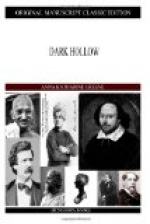His hands fell; an indefinable change had come over his aspect; he bowed and seemed about to utter an ironic apology. She felt puzzled and unconsciously she began to think. What was lacking in her statement? Something. Could she remember what? Something which he had expected; something which as presiding judge over John’s trial he had been made aware of and now recalled to render her story futile. It couldn’t be that one little thing—But yes, it might be. Nothing is little where a great crime is concerned. She smiled a dubious smile, then she said:
“It seems too slight a fact to mention, and, in-deed, I had forgotten it till you pressed me, but after we had passed the gates and were well out on the highway, I found that Reuther had left her little pail behind her here, and we came back and got it. Did you mean that, sir?”
“I meant nothing; but I felt sure you had not told all you could about that fatal ten minutes. You came back. It is quite a walk from the road. The man whose shadow you saw must have reached the bridge by this time. What did you see then or—hear?”
“Nothing. Absolutely nothing, judge. I was intent on finding the baby’s pail, and having found it I hurried back home all the faster.”
“And tragedy was going on or was just completed, in plain sight from this gap!”
“I have no doubt, sir; and if I had looked, possibly John might have been saved.”
The silence following this was broken by a crash and a little cry. Peggy’s house had tumbled down.
The small incident was a relief. Both assumed more natural postures.
“So the shadow is your great and only point,” remarked the judge.
“It is sufficient for me.”
“Ah, perhaps.”
“But not enough for the public?”
“Hardly.”
“Not enough for you, either?”
“Madam, I have already told you that, in my opinion, John Scoville was a guilty man.”
“And this fact, with which I have just acquainted you, has done nothing to alter this opinion?”
“I can only repeat what I have just said.”
“Oh, Reuther! Oh, Oliver!”
“Do not speak my son’s name. I am in no mood for it. The boy and girl are two and can never become one. I have other views for her--she is an innocent victim and she has my sympathy. You, too, madam, though I consider you as following a will-o’-the-wisp which will only lead you hopelessly astray.”
“I shall not desist, Judge Ostrander.”
“You are going to pursue this Jack-o’-Lanthorn?”
“I am determined to. If you deny me aid and advice, I shall seek another counsellor. John’s name must be vindicated.”
“Obstinacy, madam.”
“No; conscience.”
He gave her a look, turned and glanced down at the child piling stone on stone and whimpering just a little when they fell.




